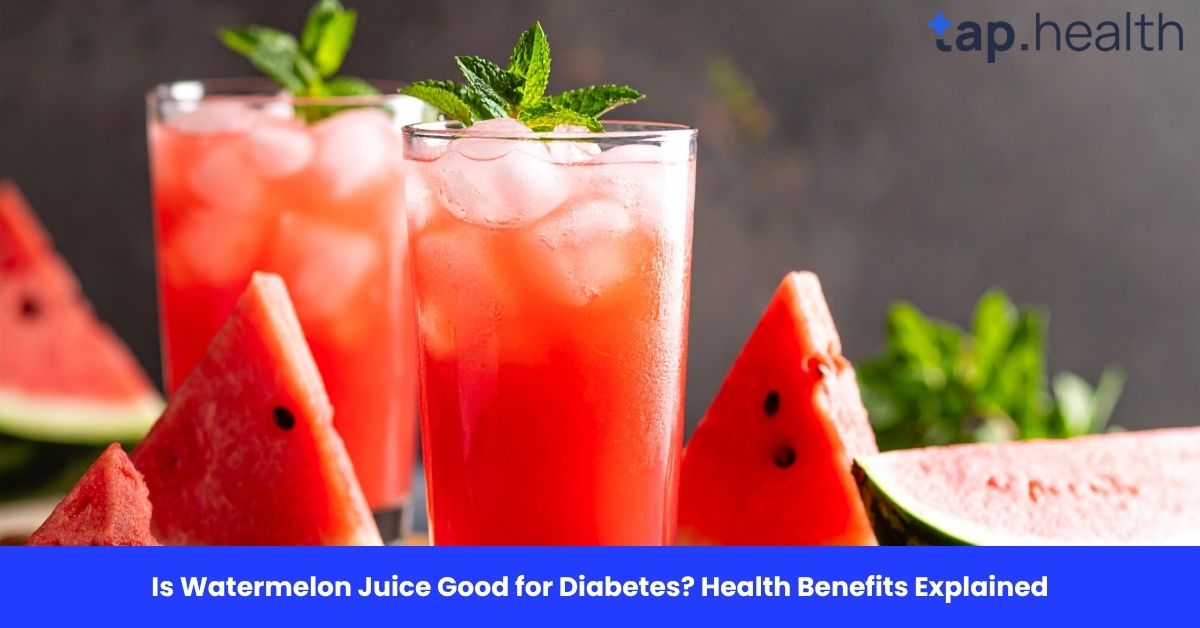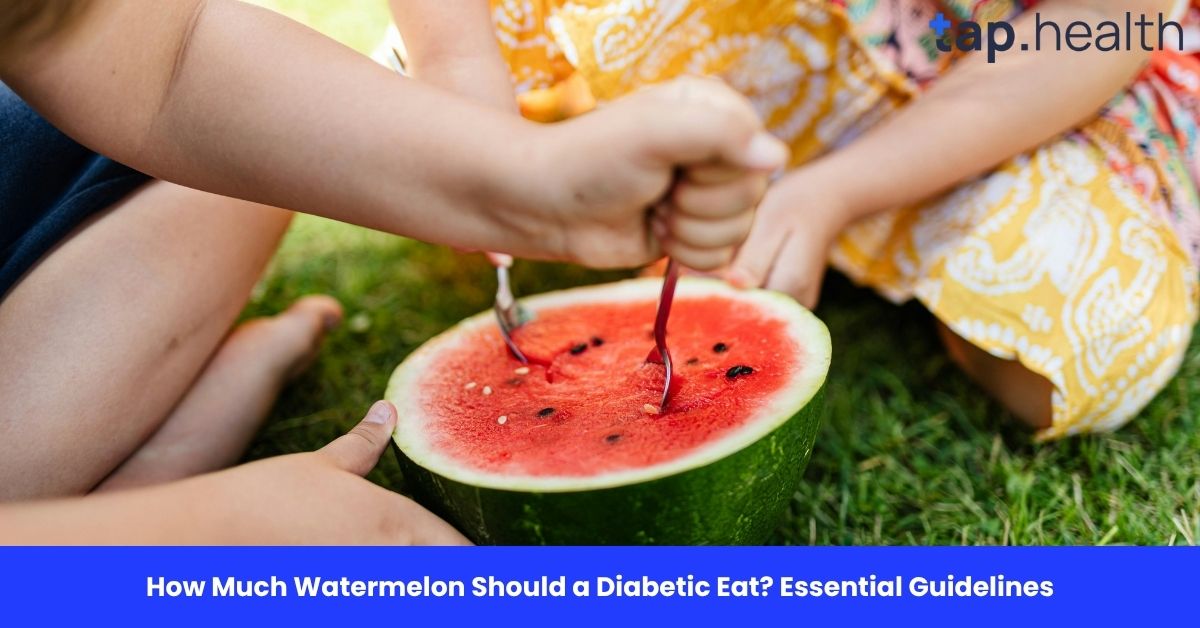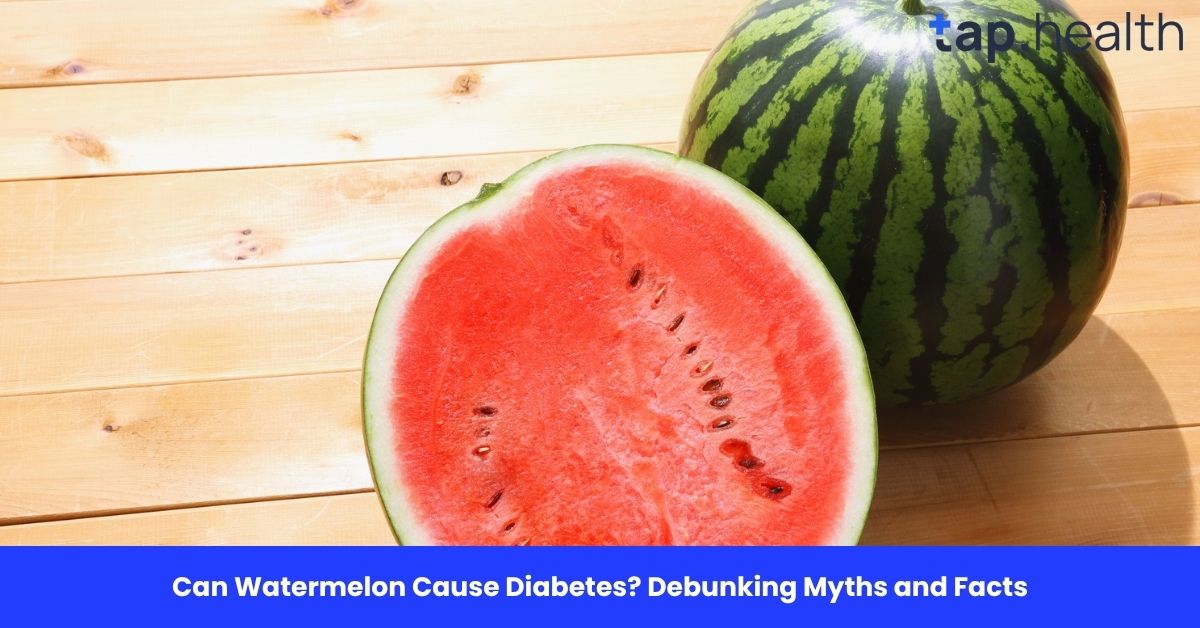Watermelon is often celebrated as a refreshing fruit, especially during hot summer months. But if you have diabetes, you might wonder: Is watermelon juice good for diabetes? This question raises concerns about how watermelon juice affects blood sugar levels and whether it can be a safe beverage choice for people managing diabetes, particularly type 2 diabetes.
In this article, we will dive deep into the nutritional profile of watermelon juice, its effects on blood sugar, its health benefits, potential risks, and practical tips on how to consume it safely for those with diabetes.
What is Watermelon Juice?
Watermelon juice is made by blending or juicing fresh watermelon flesh. Since watermelon is composed of around 90% water, the juice is light, refreshing, and naturally sweet. The juice is rich in vitamins, antioxidants, and essential nutrients like vitamin C, vitamin A, potassium, and magnesium. It also contains natural sugars like fructose and glucose, which provide the sweetness characteristic of watermelon.
While watermelon juice is a hydrating and healthy beverage, it’s important to understand how it interacts with blood sugar levels, especially for those with diabetes. Let’s break down the key nutritional components of watermelon juice:
Nutritional Breakdown of Watermelon Juice (per 100 grams):
- Calories: 30
- Carbohydrates: 7.6 grams
- Sugar: 6.2 grams
- Fibre: 0.4 grams
- Protein: 0.6 grams
- Vitamins and minerals:
- Vitamin C: 8.1 mg (about 10% of the daily requirement)
- Vitamin A: 28 µg
- Potassium: 112 mg
- Magnesium: 10 mg
Though watermelon juice is low in calories, it contains natural sugars and carbohydrates, which can impact blood sugar levels. To assess whether it is safe for diabetics, let’s look at the glycaemic index (GI) and glycaemic load (GL) of watermelon juice.
Glycaemic Index (GI) and Glycaemic Load (GL) of Watermelon Juice
Glycaemic Index (GI)
The glycaemic index (GI) is a measure of how quickly a food raises blood sugar levels. Foods with a high GI (70 or more) cause a rapid rise in blood sugar, while foods with a low GI (55 or less) cause a slower increase. Watermelon juice has a high GI of around 72, which means it can cause a quick spike in blood sugar when consumed in large quantities.
Glycaemic Load (GL)
While GI gives us an indication of how quickly food affects blood sugar, glycaemic load (GL) takes into account both the GI and the amount of carbohydrates in a typical serving. The GL of watermelon juice is relatively low, because of its high water content, which dilutes the carbohydrates. This means that a small serving of watermelon juice may have a less significant impact on blood sugar than what the GI alone might suggest.
In general, the GL of watermelon juice is around 5 for a 100-gram serving, which is considered low. Thus, moderate consumption is less likely to cause sharp spikes in blood glucose levels compared to other high-GI foods.
Is Watermelon Juice Safe for People with Diabetes?
Watermelon juice can be enjoyed by people with diabetes type 2, but like all foods and drinks, moderation is key. Let’s break down the pros and cons of watermelon juice for people managing diabetes.
Benefits of Watermelon Juice for Diabetes
- Hydration
Watermelon juice is rich in water content, which makes it an excellent option for staying hydrated. Proper hydration is essential for diabetes management since dehydration can make blood sugar control more difficult. The high water content in watermelon juice may also help reduce blood sugar concentration by diluting the amount of sugar circulating in the bloodstream. - Low in Calories
For individuals with diabetes, managing weight is often an important factor in controlling blood sugar. Watermelon juice is low in calories, making it a good alternative to higher-calorie beverages. A 100-gram serving of watermelon juice contains only 30 calories, which is minimal and can be easily included in a calorie-controlled diet. - Rich in Antioxidants
Watermelon juice is packed with antioxidants like lycopene, which has been shown to reduce inflammation and protect against oxidative stress. These antioxidants are especially beneficial for diabetics, as inflammation and oxidative stress are linked to insulin resistance and complications associated with diabetes. - Source of Vitamin C
Vitamin C is an important nutrient for immune function and wound healing. It also has antioxidant properties and may help reduce blood sugar levels over time. A glass of watermelon juice provides a good amount of vitamin C, which supports overall health in diabetics.
Potential Risks of Watermelon Juice for Diabetes
- Blood Sugar Spikes
Watermelon juice, with its high glycaemic index, can cause a rapid increase in blood sugar levels when consumed in large quantities. Even though its glycaemic load is low, drinking large amounts of watermelon juice in one sitting can still lead to uncontrolled blood sugar spikes. Therefore, diabetics should be mindful of their serving sizes and avoid excessive consumption. - Lack of Fibre
One of the drawbacks of watermelon juice is that it lacks fibre, which plays a key role in slowing down sugar absorption into the bloodstream. Unlike whole watermelon, which contains a small amount of fibre, juicing the fruit removes much of the fibre content. This means that watermelon juice might cause a quicker rise in blood sugar compared to whole watermelon. - Overconsumption of Fruit Sugars
While watermelon juice is natural and healthy, consuming large quantities of fruit juices, in general, can lead to an overload of natural sugars. This is particularly true if the juice is consumed frequently, potentially causing long-term blood sugar management issues.
How to Safely Enjoy Watermelon Juice for Diabetes
If you want to include watermelon juice in your diet as a diabetic, here are a few tips to help you enjoy it safely:
1. Stick to Small Portions
Keep your servings of watermelon juice moderate, around 100-150 ml per day, to minimise any risk of blood sugar spikes. Limiting portion sizes ensures that you don’t overconsume the fruit’s natural sugars.
2. Dilute the Juice
If you’re concerned about the sugar content in watermelon juice, you can dilute it with water or a small amount of soda water. This will reduce the sugar concentration in each serving and lower the glycaemic load.
3. Pair with Protein or Healthy Fats
To reduce the impact of watermelon juice on blood sugar, pair it with a source of protein (like a handful of nuts or a boiled egg) or healthy fats (like avocado). These nutrients help slow down the absorption of sugar into the bloodstream.
4. Avoid Adding Sweeteners
Since watermelon juice is naturally sweet, it’s best to avoid adding sugar, honey, or artificial sweeteners. Sweeteners can raise the glycaemic index of the juice, potentially leading to a spike in blood sugar levels.
5. Monitor Blood Sugar Levels
As with any new food or drink, it’s essential to monitor your blood sugar levels after consuming watermelon juice. This will help you understand how your body reacts and allow you to adjust your intake accordingly.
Also Read this: How Many Calories in a Whole Watermelon?
Key Takeaways
- Watermelon juice can be good for people with diabetes when consumed in moderation, as it’s hydrating, low-calorie, and rich in antioxidants.
- The glycaemic index of watermelon juice is high, but its glycaemic load is relatively low, meaning it may not significantly spike blood sugar levels if consumed in small portions.
- Moderation is key—too much watermelon juice can lead to blood sugar spikes, so it’s best to limit intake to small servings (100-150 ml per day).
- Pair watermelon juice with protein or healthy fats to reduce the speed at which sugar is absorbed into the bloodstream.
- Diluting watermelon juice or avoiding added sweeteners can further help make it a safer option for diabetics.
FAQ: Is Watermelon Juice Good for Diabetes?
Q: Can watermelon juice cause a blood sugar spike?
Yes, watermelon juice can cause a blood sugar spike due to its high glycaemic index. However, its glycaemic load is low, so moderate consumption is unlikely to cause a significant spike.
Q: How much watermelon juice can a diabetic drink?
A diabetic can drink around 100-150 ml of watermelon juice per day. It’s important to keep portions small to avoid large increases in blood sugar levels.
Q: Is watermelon juice better than whole watermelon for diabetics?
Whole watermelon is better than watermelon juice for diabetics as it contains fibre, which helps slow the absorption of sugar into the bloodstream. Juice lacks this fibre.
Q: Is watermelon juice good for hydration in diabetics?
Yes, watermelon juice is a great source of hydration due to its high water content, which is beneficial for diabetics, especially for maintaining kidney function and overall health.
Q: Can watermelon juice be sweetened for diabetics?
No, diabetics should avoid adding sweeteners like sugar or honey to watermelon juice, as it can increase the glycaemic index and worsen blood sugar control.
Q: What are the benefits of watermelon juice for diabetics?
Watermelon juice is hydrating, low in calories, and rich in antioxidants like lycopene, which can help reduce inflammation and improve overall health in diabetics.


